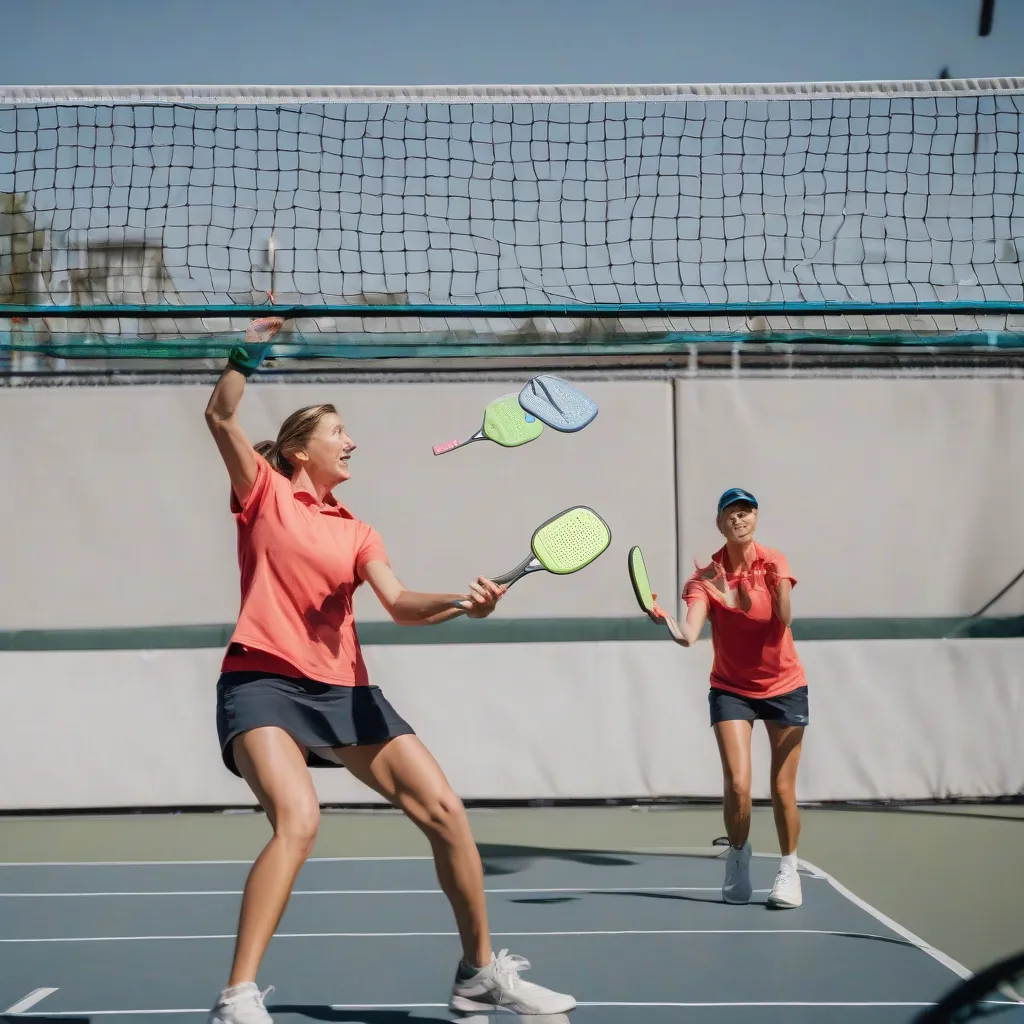Table of Contents
Introduction to Pickleball Volley Drills
Volleying is a critical skill in pickleball that allows players to maintain control at the net, execute quick reactions, and apply pressure on their opponents. Mastering various pickleball volley drills can significantly enhance your performance, making you a formidable player at the net. This guide covers the top 10 volley drills to help you improve your skills and dominate the game.
Why Volley Drills Are Important in Pickleball
Effective volley drills in pickleball offer several benefits:
- Quick Reactions: Volley drills help improve your reflexes and ability to respond rapidly to fast-paced shots.
- Net Control: Practicing volleys enhances your control and dominance at the net, allowing you to dictate the pace of the game.
- Consistency: Regular volley drills lead to more consistent and accurate shot execution.
- Strategic Play: Mastering volleys enables you to implement a wider range of strategies and tactics.
Top 10 Pickleball Volley Drills
 Pickleball Volley Drills
Pickleball Volley Drills
1. Basic Forehand and Backhand Volleys
This drill focuses on the fundamentals of forehand and backhand volleys. Stand at the net and practice hitting volleys with a partner, alternating between forehand and backhand shots. This drill helps establish a solid foundation for all other volley techniques.
2. Rapid-Fire Volleys
In this drill, a partner or coach feeds balls to you rapidly at the net. Your goal is to return each volley quickly and accurately. This drill enhances reaction time, hand-eye coordination, and stamina.
3. Cross-Court Volley Drill
Position yourself diagonally across the net from your partner. Volley the ball back and forth across the court, focusing on maintaining control and accuracy. This drill improves your ability to handle cross-court shots and maintain a consistent rally.
4. Volley-to-Volley Drill
Both players stand at the net and volley the ball back and forth without letting it bounce. This drill emphasizes control, touch, and maintaining a steady rhythm. It’s excellent for building consistency and precision in your volleys.
5. Side-to-Side Movement Drill
This drill involves moving laterally at the net while volleying. Have a partner feed balls to both sides, and practice volleying while moving side to side. This drill improves your footwork, agility, and ability to cover the net effectively.
6. Overhead Volley Drill
Practice returning high, fast-paced shots with overhead volleys. Stand at the net and have your partner feed high balls to you. Focus on maintaining control and accuracy while hitting these challenging volleys.
7. Drop Volley Drill
Work on soft, controlled volleys that drop just over the net. Practice hitting gentle volleys that land in your opponent’s non-volley zone, forcing them to move forward. This drill enhances your touch and precision.
8. Defensive Volley Drill
In this drill, focus on defensive volleys that keep the ball in play and buy you time to reset. Practice hitting deep, controlled volleys that push your opponent back. This drill helps you handle pressure and maintain control during defensive situations.
9. Angle Volley Drill
Practice hitting angled volleys that force your opponent to move laterally. Position yourself at the net and aim for the sidelines with your volleys. This drill improves your ability to create angles and open up the court.
10. Partner Coordination Drill
In doubles play, effective communication and coordination with your partner are crucial. Practice volleying with your partner, focusing on maintaining a balanced formation and covering the court efficiently. This drill enhances teamwork and strategic play in doubles matches.
Common Volley Mistakes and How to Avoid Them
Avoiding common volley mistakes can help you play more effectively:
1. Overhitting the Ball
Trying to hit the ball too hard can lead to errors. Focus on control and placement rather than sheer power.
2. Poor Positioning
Failing to position yourself correctly at the net can lead to missed opportunities. Ensure you are balanced and ready to move in any direction.
3. Inconsistent Follow-Through
Failing to follow through properly can lead to inaccurate shots. Focus on completing your swing for better consistency and control.
4. Lack of Communication
In doubles play, poor communication with your partner can lead to confusion and missed shots. Always communicate clearly and coordinate your movements.
Resources for Further Learning
For more detailed information on pickleball volley drills, explore these valuable resources:
- Visit the USA Pickleball Association (USAPA) for comprehensive guides and tips.
- Explore instructional videos and articles on Pickleball Central.
- Check out detailed reviews and tutorials on Pickleball Portal.
- Learn from top players and coaches on PickleballMAX.
Conclusion
Mastering pickleball volley drills is essential for improving your performance and gaining an advantage over your opponents. By incorporating these top 10 drills into your practice routine, you can enhance your reflexes, control, and overall gameplay. Use this guide to refine your volley skills and take your pickleball performance to the next level. With dedication and consistent practice, you’ll see significant improvements in your volleys and overall game.
Frequently Asked Questions
- Why are volley drills important in pickleball? Volley drills help improve your reflexes, net control, consistency, and strategic play, enhancing your overall performance.
- How can I improve my pickleball volley techniques? Practice the drills provided in this guide, such as basic forehand and backhand volleys, rapid-fire volleys, and cross-court volley drills.
- What are common volley mistakes in pickleball? Common mistakes include overhitting the ball, poor positioning, inconsistent follow-through, and lack of communication in doubles play.
- Where can I find more information on pickleball volley drills? Visit the USA Pickleball Association, Pickleball Central, Pickleball Portal, and PickleballMAX websites for comprehensive guides and tips.
- How does footwork affect volley techniques? Proper footwork ensures you are positioned correctly for each volley, allowing you to react quickly and maintain control at the net.